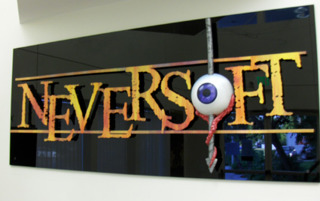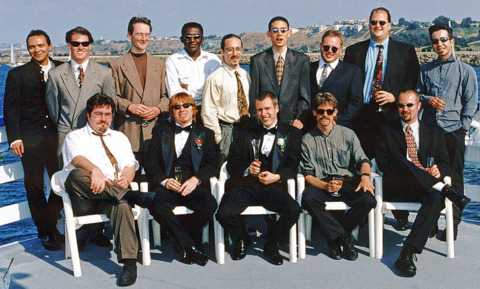Overview
 Neversoft' logo
Neversoft' logoSince it's start in 1994, Neversoft has been growing more and more over the years. During their early years they established the foundation of the company, which later led to the purchase of Neversoft by Activision. The purchase was the beginning of a great time for both Neversoft and Activision. One of their first games together, Tony Hawk's Pro Skater, gained great critical acclaim and paved the way to a successfull future.
Neversoft continued to develop games in the Tony Hawk franchise until 2007 when Activision offered them to work on the Guitar Hero franchise instead. Their first game, Guitar Hero III: Legends of Rock, became a great success and made over $100 million in its first week of release in North America, and as of July 2008, the game has sold more than 8 million copies worldwide.
History
 The Neversoft team in 1998
The Neversoft team in 1998- In July 1994, Neversoft was founded by Joel Jewett, Mick West and Chris Ward in Woodland Hills, California. They initially worked for Playmates Toys, where they begun development of a game for the Sega Genesis to go along with a cartoon show called Skeleton Warriors.
- In December 1994, five months later, the game was cancelled by Playmates Toys. Not because they were unhappy with the development progress, but because they wanted to join the 32-bit bandwagon and develop the game for the new Sega Saturn. At this time, Neversoft had expanded by hiring two additional employees; a level designer and another artist.
- 1995 was spent developing Skeleton Warriors for the Sega Saturn. Over the course of this year, Neversoft grew rapidly by hiring three programmers, five artists, a level designer, a tester and an office administrator. Skeleton Warriors was finished in time for the holiday season and Neversoft started to look for new work while they were porting the game to the Playstation.
- In 1996 Neversoft's staff grew to over twenty people. For six months they worked on a game based on Ghost Rider for Crystal Dynamics, which later was cancelled due to financial problems with the publisher. This gave them time and opportunity to work on a game of their own design called Big Guns. The engine they created for Big Guns was also to be used in their next project; they got the opportunity to convert the PC game MDK to the Playstation. Towards the end of the year, Sony Computer Entertainment bought the idea for Big Guns from Neversoft, and the game was now officially in development.
- 1997 was a tumultuous year for Neversoft. The MDK conversion were more complex and took far longer than expected, and the Big Guns game, which had been renamed to Exodus went through numerous design changes to satisfy Sony, but it was eventually cancelled in November 1997. The company shrunk back to just twelve employees. Neversoft then spent the next few months improving on their engine, while looking for more work.
- In January 1998, Neversoft was about to run out of money, but luckily they had a fortunate business meeting with Activision, who were looking for developers for Apocalypse. Their Big Guns engine was ideal for the project and Activision and Neversoft sealed a business deal.
- In May 1998 the development of Apocalypse was going along nicely, and Activision additionally requested a prototype of a skateboarding game from Neversoft. The development of the prototype was going really slow, since Neversoft really couldn't spare anyone from the development of Apocalypse. The initial prototypes impressed Activision, and when Apocalypse was done in October 1998, Neversoft immediately began working on what would later become known as Tony Hawk's Pro Skater for the Playstation and Nintendo 64. At this time Neversoft consisted 15 people: six programmers, five artists, three level designers and Joel, the President.
- In the summer of 1999, their successful cooperation led to Activision acquiring Neversoft by a stock-swap deal.
- In October 1999, Tony Hawk's Pro Skater was released. Due to the game's great reception, Neversoft started development of a sequel immediately. Meanwhile, Neversoft also started development of Spider-Man, which meant Neversoft had to split into two separate development teams working in parallel.
- In 2000, both Tony Hawk's Pro Skater 2 and Spider-Man were released, and Neversoft started development of Tony Hawk's Pro Skater 3 for Playstation 2 using the RenderWare engine.
- In 2001, Tony Hawk's Pro Skater 3 was released, and Neversoft once again immediately started working on a sequel.
- In 2002, Tony Hawk's Pro Skater 4 was released as well as a port of Tony Hawk's Pro Skater 3 for the Xbox.
- In 2003, Neversoft reworked the Tony Hawk franchise a bit, by taking a more story-oriented approach in Tony Hawk's Underground, which was released the same year.
- In 2004, Tony Hawk's Underground 2 was released. Neversoft once again decided to split the team into two groups to work on two games at once; the seventh game in the Tony Hawk franchise and the new game GUN.
- In 2005, both Tony Hawk's American Wasteland and GUN was released.
- In 2006, Tony Hawk's Project 8 was both developed and released. This was Neversoft's first game to hit the new generation of consoles consisting of Xbox 360 and Playstation 3. Yet again, Neversoft started development of another Tony Hawk game.
- In 2007, Tony Hawk's Proving Ground was released. This turned out to be the last Tony Hawk game developed by Neversoft, since Activision recently acquired RedOctane and wanted Neversoft to continue the Guitar Hero franchise. Neversoft began development of what was to become Guitar Hero III: Legends of Rock immediately and shipped the game later the same year. The Tony Hawk franchise was given to Robomodo.
- In 2008, Neversoft released the Guitar Hero spin-off title Guitar Hero: Aerosmith, which mainly - as the name suggests - features songs from the world famous rock band Aerosmith. Later the same year, a direct sequel to Guitar Hero III: Legends of Rock called Guitar Hero: World Tour was released. Given the success of full band gameplay from Harmonix's Rock Band, it was deemed necessary to include full band support in Guitar Hero: World Tour as well.
- In 2009, yet another spin-off title was released. This time it was Guitar Hero: Metallica, which included many songs from the world famous heavy metal band.
- At the end of 2009, Guitar Hero 5, Band Hero and Guitar Hero: Van Halen were released. All games featured full band game play, but were targeted at different audiences; Band Hero contained more family-friendly songs and Guitar Hero: Van Halen was the third band specific Guitar Hero game to be released.
Log in to comment